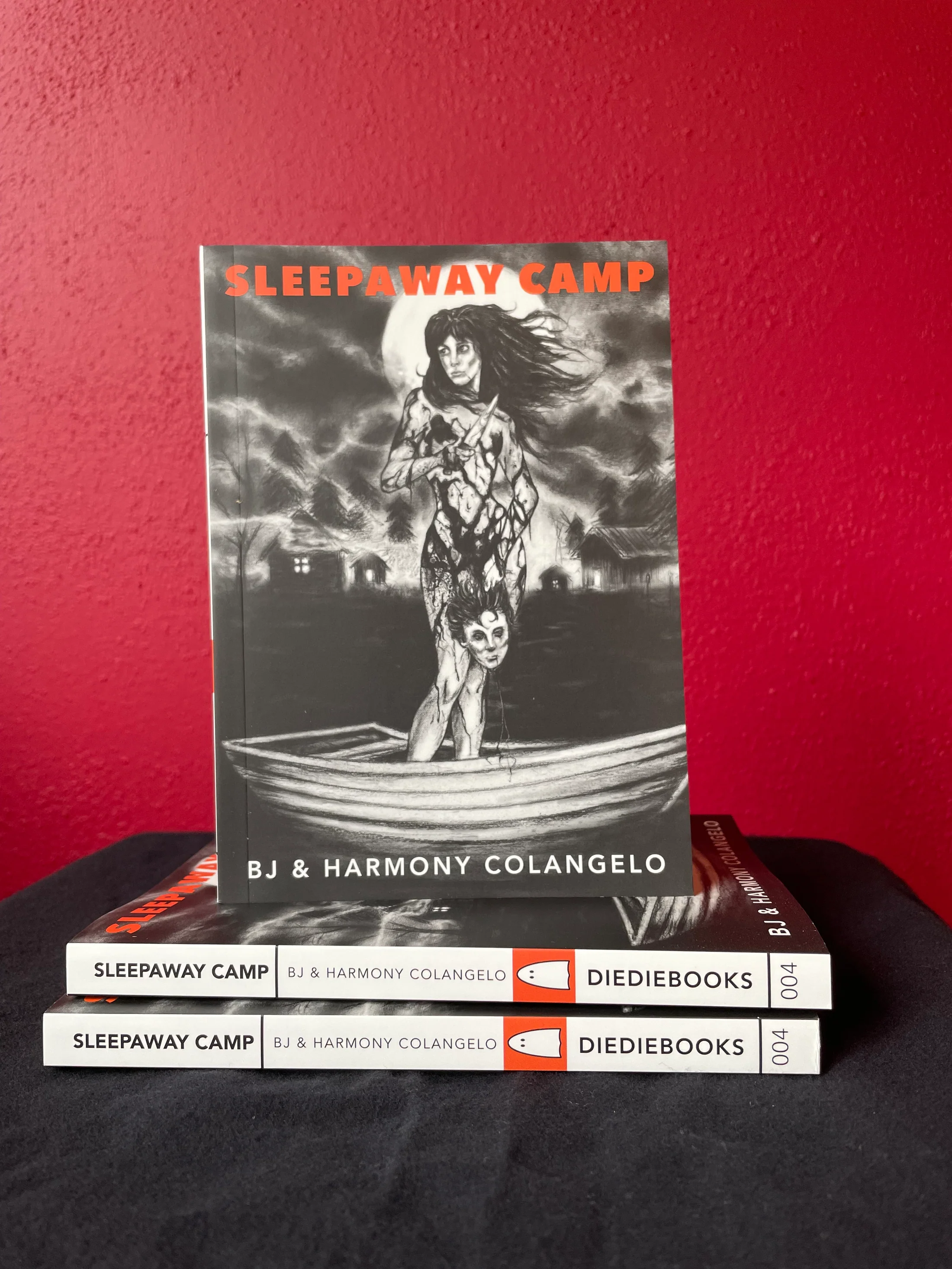DieDieBooks’ ‘Sleepaway Camp’ is a Stellar, Poignant Ode to a Controversial Classic

I spend more and more of my time enmeshed in film criticism. What was once an irregular treat is now a daily ritual and a welcome one at that. There are so many talented writers out there, especially in the genre space, and in a better world, I’d have the time available for more of them. Where that leads, of course, is outcomes and insights. What do I ultimately hope to gain from what I read in a digital landscape abounding with different voices? Ideally, a different perspective. Horror fans are more passionate than most. Anyone who has ever been to a screening or round of horror trivia can attest to that. So, new things aren’t always new, but with the right lens, something familiar can be rendered exciting, and fresh. Harmony and B.J. Colangelo have accomplished that with Sleepaway Camp, the latest from DieDieBooks.
I’ve been fortunate enough to review several titles from their slate, including Jacob Trussell’s Poltergeist, Bob Mielke’s Threads, and Philip J Reed’s The Wolf Man. Remarkably, the small press has yet to double-dip in terms of structure or approach. DieDieBooks prioritizes the singular voices of their writers, and that inimitable quality augments the text’s more familiar portions. In other words, each text reads as if it could have only been written by the person writing it.

Also Read: ‘The Vourdalak’ Review: Uncanny Horrors Linger in This Vampiric Pastoral-Noir
Harmony and B.J. Colangelo’s profound sense of genre knowledge—and, refreshingly, sense of humor—elevate Sleepaway Camp’s early chapters, namely those that review broader slasher history and Sleepaway Camp’s plot. The synopsis is necessary, if familiar, and accounts for why, even in this review, it’s worth touching upon the gist of Robert Hiltzik’s low-budget slasher.
Felissa Rose’s Angela is shuttled off to Camp Arawak alongside her cousin, Ricky (Jonathan Tiersten). Upon arriving, the bodies pile up, the deaths exclusive to those who have tormented Angela for her quiet disposition. The Colangelo wives rightfully acknowledge Sleepaway Camp’s conventional constraints—summer camp setting, POV shots from the killer— without dismissing its strengths, namely some strong performances, luridly shot flashbacks, and practical effects work from Edward French. The beats are no different than sundry other slasher movies released during those years, but few made melted flesh look so good.
Also Read: ‘A Quiet Place: Day One’ Review: The Franchise’s Best And Most Interesting Installment
Still, for anyone who has seen Sleepaway Camp, it’s not the death by beehive that’s cultivated its cult legacy. No, it’s the film’s ostensibly shocking twist ending where Angela is revealed to be the killer. That’s expected—it’s painstakingly obvious from the first frame that Angela has been whacking campers. Instead, it’s Angela’s identity that surprised audiences. She is really Peter, forced to live as Angela by her Aunt Martha (Desiree Gould). Sleepaway Camp ends not with resolution, but a slow tracking shot of Angela, naked and covered in blood, wailing on the lake’s edge.
I used “ostensibly” above because, as adroitly detailed by Harmony and B.J., that kind of gendered panic and subsequent reveal wasn’t exactly new. Historically, horror has been a remarkably queer genre, though it has reinforced noxious ideals all the same. For general audiences, the horror doesn’t manifest in sympathy for Angela, but instead fear and revulsion that a character thought to be a girl isn’t. There’s a word for that, isn’t there? As an added touch, the book includes snippets from several contemporaneous reviews, several of which are… troubling.
The wives’ analysis arrives halfway through, wisely probing the film as text and metatext in a larger horror ecosystem. Pointedly, Sleepaway Camp resists decisiveness. The queer analysis is compelling and regularly convincing, especially for readers like me who are familiar with the film without having given it much thought beforehand, though they leave room open for dovetailing perspectives.
Also Read: ‘Video Vision’ Chattanooga Film Festival 2024 Review: Queer Romance Wrapped in a Wobbly Techno-Horror Premise
Yet, the poignant final chapters might well render this Angela’s gospel. A deeply felt conclusion both eschews Angela’s transness and makes an urgent, metatextual appeal to resist pigeonholing critics. While co-written, Harmony’s voice takes over, recounting years of peripheral involvement in a horror community, a community predicated on openness that tokenized her identity. Sleepaway Camp is a compelling, thoroughly researched slice of film history. More importantly, it’s a reminder that voices like B.J.’s and Harmony’s are at risk. At risk of hostile anti-trans and anti-queer legislation, and more specifically, at risk of exclusion in a community that should be celebrating them. And celebrating them in their entirety, not just for movies or months where their voices are items on a checklist.
Both are remarkable writers and with Sleepaway Camp, they’ve put Angela’s story to rest. It’s an opus, of sorts, a testament to their strengths as critics and a swan song for a film that has been discoursed to knife-through-a-shower-stall-death. In other words, it’s a must-read, a reminder of or introduction to two of the strongest voices working in the genre space today. Don’t sleep on it.
You can purchase a copy of Sleepaway Camp here.
Categorized: Reviews
